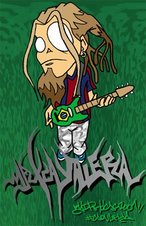
If it keeps on rainin', levee's goin' to break, [X2]
When The Levee Breaks I'll have no place to stay.
Mean old levee taught me to weep and moan, [X2]
Got what it takes to make a mountain man leave his home,
Oh, well, oh, well, oh, well.
Don't it make you feel bad
When you're tryin' to find your way home,
You don't know which way to go?
If you're goin' down South
They go no work to do,
If you don't know about Chicago.
Cryin' won't help you, prayin' won't do you no good,
Now, cryin' won't help you, prayin' won't do you no good,
When the levee breaks, mama, you got to move.
All last night sat on the levee and moaned, [X2]
Thinkin' about me baby and my happy home.
Going, going to Chicago... Going to Chicago... Sorry but I can't take you...
Going down... going down now... going down....
1927/2005 the same story repeats: leeve collapse, Missisipi floods and thousands of mainly poor black people met with disaster, left in their fates by authorities
We read in wikipedia very interesting information and interpretation for this great song:
The original work for "When the Levee Breaks" was produced by the blues musical duo known as "Kansas Joe McCoy" and "Memphis Minnie." The lines at the end of the song, "Going to Chicago; sorry but I can't take you", quote "Going to Chicago Blues" by Jimmy Rushing and the Count Basie Orchestra.
In the first half of 1927, the Great Mississippi Flood ravaged the state of Mississippi and surrounding areas. It destroyed many homes and ravaged the agricultural economy of the Mississippi Basin. Many people were forced to flee to the cities of the Midwest in search of work, contributing to the "Great Migration" of African Americans in the first half of the 20th century. During the flood and the years after it subsided, it became the subject of numerous Delta blues songs, including "When the Levee Breaks", hence the lyrics, "I works on the levee, mama both night and day, I works so hard, to keep the water away" and "I's a mean old levee, cause me to weep and moan, gonna leave my baby, and my happy home".
The song focused mainly on when more than 13,000 residents in and near Greenville, Mississippi evacuated to a nearby, unaffected levee for its shelter at high ground. The tumult that would have been caused if this and other levees had broken was the song's underlying theme
……
The song has a significant second connotation, aside from the literal breaking of water-retaining levees by floodwaters. The song was inspired originally by an event rife with social strife (when the levees broke in 1927, black labor was forced to repair it at gunpoint), and this fact carries through in the lyrics. Plant expanded the lyrics to include such phrases as "If you're goin' down south / they got no work to do / if you don't know 'bout Chicago" that add to the original themes of the poor being disenfranchised--the poor, working classes are the ones whose homes are going to be destroyed by floodwaters, and they are the ones who will have nowhere to go afterward.
The second connotation of the song is built on an interesting twist. If the song is interpreted as a social statement reflecting class issues, then the poor themselves become the raging storm, restrained by oppressive (often governmental) institutions (the levees), and who will inevitably strike down what restrains them. In this interpretation, 'when the levee breaks,' it will be the former oppressors whose constructs are destroyed and who are cast out into the cold. In this interpretation, the song serves as a warning to oppressive upper classes that if they provoke a raging storm of social fury, they may sit on their social levee and "weep and moan," but "crying won't help [them], praying won't do [them] no good."
You can hear this song in youtube with a slide presentation from New Orleans hit by Katrina and leeve collapse
http://www.youtube.com/watch?v=Z_Ny9_CrUVY




2 comments:
This re-worked blues with lyrics about the Mississipi flood of 1927 takes a totally different meaning after the floods in New Orleans caused by Hurricane Katrina.
The link with Katrina was made anyway in a documentary by Spike Lee, entitled "When the Levees broke", which is a direct play on the title of the song. The film focuses on the suffering of those affected by the disaster and their will to survive. The film points out that the disaster in New Orleans was preventable, caused by levees poorly designed by the United States Army Corps of Engineers, with the suffering afterwards greatly compounded by failures at all levels of government, most severely at the Federal level.
http://en.wikipedia.org/wiki/When_the_Levees_Broke
Since the Hurricane itself was linked with the Global Warming phenomenon (and the proposed increased frequency of hurricane occurences), the song becomes a protest against the human induced increase of CO2 concentrations within the Earth's atmosphere.
See also:
http://en.wikipedia.org/wiki/Alternative_theories_regarding_Hurricane_Katrina
This won't succeed in actual fact, that is what I believe.
Post a Comment